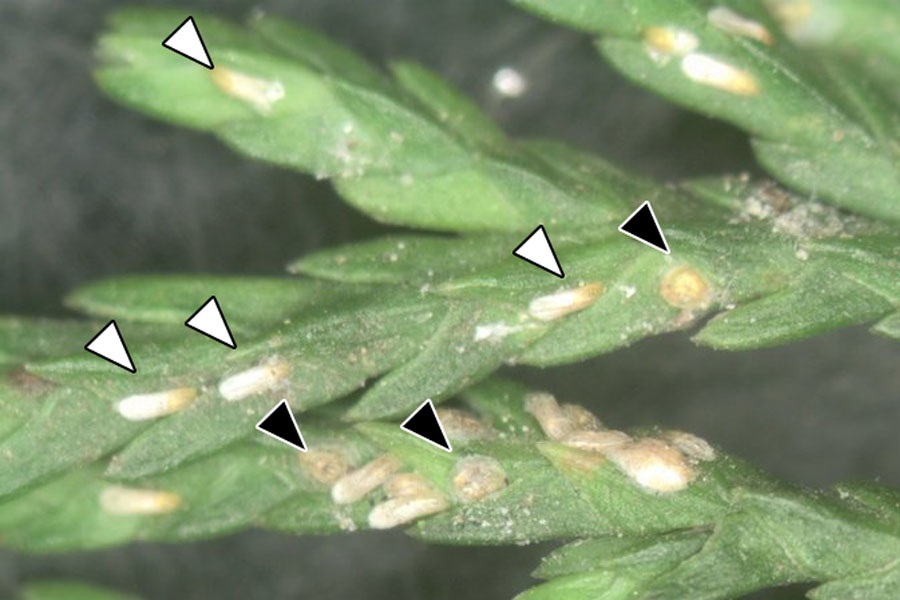- Zoning and Easements
- Farm Business Planning
- Farm Business Planning Tools
- Farm Business Organization and Legal Structures
- Loans, Cost-Share Programs, and Grants
- Licenses, Certifications, Regulations, and Tax Exemption
- Identification Numbers
- Training
- Support
- Additional Resources
- References
Starting a farming or commercial production enterprise requires more than knowledge of agriculture or livestock management. The business side of farming is a critical factor in the success and sustainability of the enterprise. New and beginning farmers have many questions about planning, licensing requirements, financing options, training, and more (see Table 2). This publication can help answer some of those questions.
Zoning and Easements
Just as it is with other businesses, zoning is important for a farm enterprise. The local county or city government has the power to decide how land or districts within their jurisdiction may be used. Zoning allows land to be used for certain activities and prohibits its use for other activities. Examples of land zoning uses include agricultural, residential, commercial, industrial, historical preservation, or other special use. Before purchasing land or beginning to farm on land you own, check to see if it is zoned for agricultural use. Land that is zoned agricultural may still have restrictions that prohibit raising certain livestock, erecting fences, or building structures.
Agricultural land may also have easements that restrict use. Land enrolled in a conservation easement, such as the Wetlands Reserve Easement or the Healthy Forests Reserve Program offered through the USDA Natural Resources Conservation Service, will be restricted to the land-management practices of the conservation plan. A right-of-way easement for utility power lines also can limit land-use practices in the easement area.
Farm Business Planning
The business plan is where ideas turn into statements and goals are laid out with a supporting structure and measurements to gauge success. A business plan also is required for loans, IRS audits, and other funding applications.
Sections included in a typical business plan are explained below. Italicized words in the descriptions should be used as subheadings to organize information within each section.
Cover page
This identifies the business or farm. Include the business name, location, contact information, and logo.
Executive summary
Summarize all the information in the business plan, along with business goals, in just one or two paragraphs. Write your executive summary last.
Business description
Use this section to:
- describe what business activities are already happening on the farm (overview);
- provide details of the location, including important factors such as size, terrain, access and distance to markets, nearby farms or businesses, and whether you own or rent the land;
- describe the facilities and equipment in place to support farm activities, including age, condition, and ownership;
- explain the history of the business in terms of longevity, sales and profitability, recent changes, and important successes and challenges; and
- state the ownership and legal structure of the business (see Table 1).
Operations
In this section describe:
- products and services of the business, such as apples, beef, hunting leases, or agritourism;
- details about the production system, including technology and machinery, average yield, sales, inventory, and inventory management practices;
- licenses and certifications obtained or required, including the issuing agency and detailed plans for acquiring and/or maintaining them;
- insurance, safety protocols, risk assessment and mitigation, contingency plans, and other practices that address risk management;
- regulations that apply to your business and actions taken or planned to maintain compliance;
- management practices implemented to address environmental concerns, such as erosion and pesticide drift;
- quality control and livestock health management practices; and
- the timeline for major changes within the business, such as constructing new facilities, with details on the nature of the change, costs and funding sources, and anticipated impact on the business.
Marketing plan
Use this section to explain:
- market trends and competition;
- details of the marketing strategy, including anticipated buyers (consumers, restaurants, processors, retailers), location and time of sales, and transaction type (contract, cash);
- website and social media strategy, and online selling options; and
- competitive advantages, such as value-added products, processing contracts, and strategic partners.
Management and organization
Provide information in this section about:
- principal employees of the business, including their roles or job titles, responsibilities, and qualifications for management team positions;
- boards of directors or advisory boards, if applicable to the business;
- major business tasks and the employee assigned to each, as well as personnel plans for business contingencies, expansion, or changes; and
- outside professional services, such as accounting or tax preparation, the business uses.
Financial plan
In this section, specify:
- the business’s financial situation (access or availability of capital);
- benchmarks to show how your business compares financially to similar businesses;
- the capital request if applying for a loan; and
- existing operational information, if applicable. Be sure to provide:
- past records that illustrate historical performance;
- documentation of assets and liabilities to show the business’s current financial position;
- 3-year financial projections for cash flow and income;
- strategies for asset management; and
- the purpose for applying for a loan and provide details about how the funds will be used.
Farm Business Planning Tools
Business plan templates and tools can be found online, including some specific to farming like the University of Minnesota’s “AgPlan.” The University of Georgia Small Business Development Center offers classes in creating a business plan. SBDC professionals also will review a business plan and advise whether it is ready to submit for loan or funding purposes.
The University of Georgia Department of Agricultural and Applied Economics develops enterprise budgets, decision aids, feasibility studies, and production guides that are useful for making production decisions and financial projections. These tools also are available online. In addition, the USDA Market News from the U.S. Department of Agriculture Agricultural Marketing Service is an extensive online resource for researching current and historic prices of farm commodities. See the additional resources section for links to these and other online resources.
Farm Business Organization and Legal Structures
There are a variety of business organizational structures that farm businesses may choose to utilize (Table 1). Forms and paperwork are necessary to establish the legal organizational structure of the farm businesses and must be filed at the state, local, and/or county level. Corporations, limited liability companies, limited partnerships, and cooperatives are required to file a variety of forms with the Office of the Georgia Secretary of State. Sole proprietors and general partnerships need to obtain a business license from the local city or county government and may be required to register the business name. All business entities must register with the department of revenue in their state and the federal Internal Revenue Service. More complete start-up information is available through the Secretary of State’s office and, for cooperatives, through the local USDA Rural Development office.
Table 1. Considerations for business structure decisions.
| Structure | Ownership | Personal Liability | Tax Liability | Required to File With |
|---|---|---|---|---|
| Sole Proprietorship | One person | Full | Personal | City/county government |
| Partnership | Two or more people | Full | Pass-through/ Personal | City/county government |
| Limited Partnership | Two or more people | Limited | Pass-through/ Personal | SOS Corporations Division |
| Limited Liability Company (LLC) | One or more people | Limited | Pass-through/Personal | SOS Corporations Division |
| Corporation | One or more people | Limited | Corporate | SOS Corporations Division |
| Nonprofit | One or more people | Limited | Exempt | SOS Corporations Division |
| Cooperative | Members | Limited | Pass-through/Personal | SOS Corporations Division |
Loans, Cost-Share Programs, and Grants
The USDA offers numerous types of farm ownership loan programs, including loans specifically to help beginning farmers purchase a family-size farm or ranch. USDA Farm Service Agency (FSA) farm ownership loans offer up to 100% financing and the interest rate will be the lower rate in effect at the time of loan approval or at the time of closing the loan. Applicants must meet eligibility requirements to qualify for loans.
Farm Credit Associations of Georgia—AgGeorgia Farm Credit, AgSouth Farm Credit, and SW Georgia Farm Credit—are cooperative membership associations. Farm Credit makes loans for a high percentage of purchase price for farmland, timberland, improvements, and construction. A share of the profits earned from these associations is returned to members each year. Farm Credit also maintains listings of land for sale.
Cost-share programs through the USDA Natural Resources Conservation Service (NCRS) help pay for farm improvements that prevent soil erosion, protect water and air quality, and conserve energy. Through cost-share programs like the Environmental Quality Improvement Program and Conservation Stewardship Program, NRCS and landowners co-invest in conservation projects.
Grants, internships, and volunteer labor are difficult to come by and are not typically available for small agribusinesses.
Licenses, Certifications, Regulations, and Tax Exemption
Various licenses may be required for operating a business, selling certain types of products, purchasing and applying pesticides, and other farm business operations. Business license requirements vary by county, local ordinance, and business type.
For agricultural production, the Georgia Department of Agriculture (GDA) is the regulating and licensing agency. After applicants satisfy training requirements, GDA issues:
- pesticide applicators licenses to allow for the purchase and application of restricted-use agricultural pesticides to agricultural land owned or farmed by the license holder;
- egg candling certificates to allow off-farm sale of table eggs for food consumption; and
- cottage industry licenses for the sale of certain types of processed food products, such as dried herbs, homemade breads, cakes, jams, and candy.
Producers may need additional licenses issued by GDA for activities such as selling live plants or processed food products with a higher health risk than those in the cottage industry category.
GDA is also the agency that issues the Georgia Agricultural Tax Exemption, or GATE, card. Farmers who qualify for the GATE card may make tax-exempt purchases of equipment and inputs related to farm production. Requirements and online applications for licenses and GATE are available through the GDA website.
Some certifications are desirable or recommended, either to enhance the safety of produce grown at the farm or for marketing purposes, including certifications for good agricultural practices, good handling practices, and produce safety. Other certifications, such as USDA Organic and Certified Naturally Grown may be desirable for marketing. Obtaining and maintaining certification may require training, record keeping, farm inspections, or combinations of these and other actions that satisfy requirements of the certifying agency.
Identification Numbers
Businesses need certain numbers to identify them for different purposes. Farm enterprises may need some or all of the following identification numbers:
Federal tax identification number
Issued by the IRS, this also is known as the Employer Identification Number and appears as EIN on forms. Businesses need this number to open a bank account and apply for business licenses and permits.
Businesses also need an EIN if they:
- pay employees
- operate as a corporation or partnership
- file tax returns for employment, excise, or alcohol, tobacco, and firearms
- withhold taxes on nonwage income paid to a nonresident alien
- use a Keogh (tax-deferred) pension plan
- work with certain types of organizations, including farmers’ cooperatives
State tax identification number
Issued by state departments of revenue, this number and the requirements for obtaining it vary by state. In Georgia, a state tax identification number is the starting point to register for permits, licenses, and specific tax numbers for business activities such as:
- withholding state taxes on employees
- interstate transportation of people or property and for vehicles exceeding 26,000 lb and/or having more than two axles
- selling alcohol and/or tobacco, whether retail or wholesale
Farm number
Issued by the USDA FSA, this is required to apply for USDA and FSA loans, disaster assistance, and NRCS conservation cost-share programs such as EQIP and CSP.
Premises identification number
Issued through the GDA, this number is required for any farm operation that moves livestock across state lines. The ability to trace animal movement from the originating farm is part of the USDA’s effort to control and eradicate animal diseases.
Training
Training courses, such as the Journeyman Farmer Certificate Program offered by University of Georgia Cooperative Extension, are useful for learning the basics of business planning, crop or livestock production and management, food and farm safety, and marketing and selling products. In addition, courses in farm management offered by UGA Extension may be accepted as qualifying education for certain USDA loans that require postsecondary agricultural education, training, or experience in farming.
Produce safety training introduces farmers to the Food Safety Modernization Act and management practices that reduce the risk of contaminating produce. Produce safety training is offered by GDA, UGA Extension, and the Produce Safety Alliance.
UGA Extension offers online training for agricultural (private) pesticide applicator licenses. Many agencies, including UGA Extension, offer the recertification training required for license renewal.
Support
New and experienced farmers can benefit from a variety of member organizations and associations that support producers of specific commodities and can provide invaluable opportunities to talk to experienced farmers in similar businesses. Here are examples of how these organizations help farmers:
- Georgia Farm Bureau represents farmers in legislative policymaking. It also offers a range of insurance products to protect farmers and their businesses.
- Georgia Young Farmers Association provides agricultural education for adults.
- Georgia Agribusiness Council promotes agricultural businesses through economic development and legislative representation.
- Commodity and growers’ associations support research and promote the benefits of the products to consumers. There are associations at the state level and some at the national level.
- Trade publications produced by these groups are an excellent resource of information on markets, regulations, government programs, and agricultural policies.
Links to these organizations are included in the additional resources section below.
Table 2. Summary of farm business resources.
| What is it? | Why do I need it? | Where do I get it? |
|---|---|---|
| Zoning information | To comply with land use regulations | Local county or city planning and zoning department |
| Potential funding | To start or expand a farm | USDA, Farm Service Agency, Farm Credit Associations |
| Farm number | To access USDA programs | Farm Service Agency |
| Premises identification number | Livestock traceability for disease outbreaks | Georgia Department of Agriculture |
| GATE card | Tax-exempt purchases of farm inputs | Georgia Department of Agriculture |
| Business license | May be required by local government for some activities | Local county or city government |
| Farm/food-specific licenses | Required for certain farm production and sales activities | Georgia Department of Agriculture |
| Training or education | To gain knowledge about business and farming; may be required for some loan programs | UGA Cooperative Extension, agricultural and technical colleges, UGA Small Business Development Center, other programs |
| Certifications | To demonstrate commitment to good agricultural practices; for marketing purposes | Various agencies |
Additional Resources
AgPlan—online tool for writing a business plan for agricultural businesses: agplan.umn.edu
Certified Naturally Grown: naturallygrown.org
Georgia Agribusiness Council—state association for agribusiness interests: www.ga-agribusiness.org
Georgia Cattlemen’s Association—promotes advancement of the cattle industry: www.georgiacattlemen.org
Georgia Cotton Commission—supports research, education, and promotion of the cotton industry: georgiacottoncommission.org
Georgia Department of Agriculture—for GATE card, certain types of licenses, and regulatory information: agr.georgia.gov
Georgia Farm Bureau—farmer support and insurance agency: www.gfb.org
Georgia Peanut Commission—supports research, education, and promotion of peanut industry: gapeanuts.com/about/
Georgia Pecan Growers Association—supports research and promotion of pecans: georgiapecan.org
Georgia Poultry Federation—represents interests of the poultry industry and supports producers: www.gapf.org
Georgia Young Farmers Association—agricultural education for adults: www.gaaged.org/youngfarmers/
Produce Safety Alliance—training on produce safety for growers: producesafetyalliance.cornell.edu/training/grower-training-courses/
UGA Agricultural and Applied Economics—crop and livestock enterprise budgets, decision aids, publications, and more: agecon.uga.edu/extension.html
UGA Extension—for information, publications, calendar of classes and events, and county Extension office contact information: extension.uga.edu
UGA Small Business Development Center—offers training, advisement, and resources for small business owners: www.georgiasbdc.org
USDA Farm Service Agency—provides farm identification number, farm loans, and other farm support services: www.fsa.usda.gov
USDA Market News—resource for up-to-date data on commodity prices, volume, quality and condition: www.ams.usda.gov/market-news/
USDA Natural Resources Conservation Service—provides cost-share programs for conservation and environmental improvement initiatives: www.nrcs.usda.gov/wps/portal/nrcs/main/national/programs/
USDA Organic Standards—information on organic certification and standards: www.ams.usda.gov/grades-standards/organic-standards
References
Bowen, B. L. (2020). An overview of local government land use regulation. Jenkins, Bowen, & Walker, P.C. https://www.jbwpc.com/Articles/Zoning-and-Land-Use-The-Basics/AN-OVERVIEW-OF-LOCAL-GOVERNMENT-LAND-USE-REGULATION.shtml
Farm Service Agency. (n.d.) Farm ownership loans. U.S. Department of Agriculture. https://www.fsa.usda.gov/programs-and-services/farm-loan-programs/farm-ownership-loans/index
Georgia Department of Agriculture. (n.d.). https://agr.georgia.gov/
Georgia Department of Agriculture. (n.d.). Food safety. https://agr.georgia.gov/food-safety
Georgia Department of Revenue. (n.d.). Tax registration. https://dor.georgia.gov/
Georgia Power. (2021). Right-of-way use. https://www.georgiapower.com/community/environment/trees-and-right-of-way/right-of-way-use.html
Natural Resources Conservation Service. (n.d.). Programs & initiatives. U.S. Department of Agriculture. https://www.nrcs.usda.gov/wps/portal/nrcs/main/national/programs/
Office of the Georgia Secretary of State. (n.d.). First stop business guide. https://sos.ga.gov/index.php/corporations/first_stop_business_guide
United States Department of Agriculture. (2011). Understanding cooperatives: How to start a cooperative (CIR No. 45, Section 14). https://www.rd.usda.gov/files/CIR45-14.pdf
United States Small Business Administration. (n.d.). Choose a business structure. https://www.sba.gov/business-guide/launch-your-business/choose-business-structure
United States Small Business Administration (n.d.). Get federal and state tax identification numbers. https://www.sba.gov/business-guide/launch-your-business/get-federal-state-tax-id-numbers
University of Georgia Cooperative Extension. (2021). Budgets. UGA Department of Agricultural and Applied Economics. https://agecon.uga.edu/extension/budgets.html
University of Minnesota Center for Farm Financial Management. (2021). AgPlan. https://agplan.umn.edu/Default.aspx






